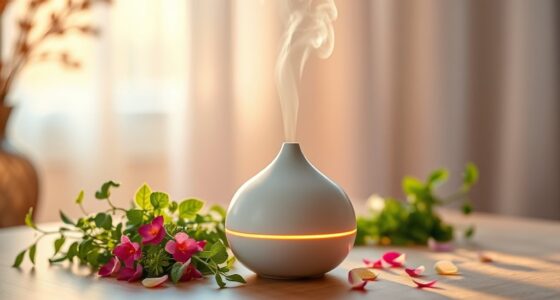When choosing between ultrasonic and nebulizing diffusers, consider your needs for scent strength, humidity, and maintenance. Ultrasonic diffusers are quiet, easy to use, and add moisture to the air, making them ideal for gentle diffusion and humidification. Nebulizers provide a more potent, faster scent by using pure oils without water but may require more upkeep. Exploring these differences further can help you select the perfect diffuser for your space and preferences.
Key Takeaways
- Consider ultrasonic diffusers for quiet operation, humidification, and easy maintenance, suitable for general aromatherapy needs.
- Choose nebulizers for a more potent, faster scent, and use of pure essential oils without water.
- Be aware that ultrasonic diffusers require regular cleaning to prevent mold, while nebulizers need disassembly for cleaning chambers.
- Nebulizers tend to be more expensive and noisier, ideal for strong fragrance needs; ultrasonic models are budget-friendly and energy-efficient.
- Match your choice to your environment and preferences by weighing scent strength, maintenance, noise level, and additional humidification benefits.

Selecting the right aroma diffuser can considerably enhance your space and mood, but with so many options available, it’s important to choose one that meets your specific needs. Two popular types are ultrasonic and nebulizing diffusers, each offering distinct benefits and considerations. Understanding their differences can help you decide which is best suited for your lifestyle and preferences.
Ultrasonic diffusers are widely favored for their quiet operation and ease of use. They use ultrasonic vibrations to break down essential oils into fine mist, dispersing a cool, fragrant vapor into the air. Because they rely on water, they also act as humidifiers, adding moisture to dry environments. When using an ultrasonic diffuser, you simply add a few drops of your favorite essential oils to the water tank, turn it on, and enjoy the calming aroma. Maintenance is straightforward; you just need to regularly clean the water reservoir to prevent mold or buildup, ensuring ideal diffusion and air quality. Regular cleaning also prolongs the diffuser’s lifespan and maintains its efficiency, so don’t neglect diffuser maintenance. Additionally, ultrasonic diffusers tend to be more affordable and energy-efficient compared to nebulizers.
Nebulizing diffusers, on the other hand, are more potent and do not require water. Instead, they work by forcing air through a tube connected to a small chamber filled with pure essential oils, creating a concentrated, aromatic mist. Because there’s no water involved, nebulizers produce a stronger scent more quickly, making them ideal if you want a more intense aroma or faster diffusion. They’re also beneficial if you prefer to use essential oils in their purest form, without dilution. However, these diffusers tend to be noisier and require more frequent cleaning to prevent clogging from residual oils. Maintaining a nebulizing diffuser involves regular disassembly and cleaning of the small chambers and nozzles, ensuring that the oils don’t clog the system and that the diffuser continues to operate smoothly.
Choosing between ultrasonic and nebulizing diffusers depends on your priorities. If you want a quiet, multi-purpose device that adds humidity and is easy to maintain, an ultrasonic diffuser is a great choice. If you’re after a more potent, faster-acting aroma with a focus on pure essential oils, a nebulizer might be better. Whichever you select, remember that proper diffuser maintenance is key. Regular cleaning prevents buildup, ensures consistent scent diffusion, and prolongs your diffuser’s life. Keep your essential oils stored properly and follow the manufacturer’s cleaning recommendations, and you’ll enjoy a consistent, delightful aroma in your space. Proper diffuser maintenance and understanding the differences can help you create a more relaxing and inviting environment tailored perfectly to your needs.
Frequently Asked Questions
Which Diffuser Is Better for Allergy Sufferers?
If you’re an allergy sufferer, you want an aroma diffuser that improves air quality without aggravating symptoms. Nebulizing diffusers are better since they don’t require water, producing pure, concentrated essential oils that can help purify the air. Plus, their sleek design adds aesthetic appeal. Ultrasonic diffusers might disperse water particles that could worsen allergies. So, for air quality improvement and visual appeal, nebulizing diffusers are your best choice.
How Loud Are Ultrasonic Versus Nebulizing Diffusers?
Like a whispering breeze, noise levels differ between ultrasonic and nebulizing diffusers. Ultrasonic models produce a gentle hum, akin to a soft lullaby, making them quieter and ideal for bedrooms. Nebulizing diffusers, however, are louder, with a sound comparison to a light ticking clock. If you prefer tranquility, ultrasonic diffusers are your best bet, while nebulizing ones might interrupt your peace with their more noticeable sound.
Can These Diffusers Be Used With Essential Oils Safely?
Yes, both ultrasonic and nebulizing diffusers are generally safe for essential oil use, but you need to take into account essential oil compatibility and diffuser material. Ultrasonic diffusers work well with most oils, but avoid thick or citrus oils that can clog the device. Nebulizing diffusers are highly compatible with essential oils and don’t require water. Always check the diffuser material to make sure it won’t be damaged by certain oils, and follow manufacturer guidelines for safe use.
What Maintenance Is Required for Each Type?
Although some might think maintenance is complex, it’s quite straightforward. For ultrasonic diffusers, you should clean them every 1-2 weeks with a mild soap and water to prevent oil buildup, and replace parts like the ultrasonic disc when necessary. Nebulizing diffusers require less frequent cleaning—about once a month—and you should check for clogged nozzles or worn-out seals. Regular upkeep ensures peak performance and longevity.
Which Diffuser Is More Energy-Efficient?
When considering energy consumption, ultrasonic diffusers are generally more power-efficient than nebulizing ones. They use less electricity because they operate at lower power levels, making them ideal if you want to save on energy costs. Nebulizing diffusers tend to consume more power due to their high-pressure airflow and atomization process. So, if you prioritize power efficiency and lower energy bills, ultrasonic diffusers are your best choice.
Conclusion
When choosing between ultrasonic and nebulizing diffusers, consider your space and preferences. Ultrasonic diffusers are quiet and energy-efficient, making them perfect for everyday use, while nebulizing diffusers offer a more potent aroma for larger areas. Did you know that the global essential oils market is projected to reach $21.8 billion by 2025? Selecting the right diffuser can enhance your environment and elevate your wellness routine—so pick the one that best fits your lifestyle and enjoy the benefits of aromatic bliss.









